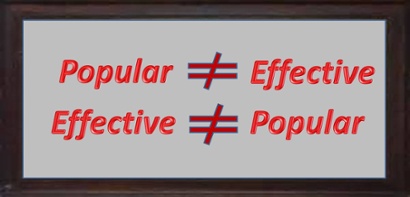It seemed that Jerry was the example of effective leadership. He never interfered with his subordinate leader’s areas or responsibility, he was well liked by everyone, and the organization was running smoothly. Then one day a crisis struck and investigation revealed that Jerry was not as effective a leader as he seemed. He had failed to stop bad behavior or take the tough action required to enforce the organization’s standards. As a result the organization suffered and lives were at risk.
As my own leadership development took me to higher levels of responsibility, I never forgot that lesson. Though I too respected and liked Jerry, I had learned that being an effective leader and being liked by subordinates are two different things. Of course I wanted my teams to like me, but Jerry had proven that being liked could not be my ultimate goal. An effective leader strives to accomplish the organization’s mission while supporting and developing subordinates. Usually, a team will like and appreciate that approach. But their affection is not a measurement of leadership effectiveness.
Abraham Lincoln reportedly said, “You can please all the people some of the time and some of the people all the time but not all the people all the time.” Over the years, I’ve developed a similar theory that has never failed me. A leader who is loved by all is probably not an effective leader. A leader who is hated by all is also most likely ineffective. A leader who is loved (or at least liked) by most but disliked by a few is probably the most effective leader.
Some years ago, Paul Hersey and Kevin Blanchard developed the Situational Leadership model. Simply stated, Hersey and Blanchard showed that a leader’s style should be determined by both the type of follower and the follower’s readiness for the task. Leaders must adapt their style of leadership to the readiness of their followers. That means leaders must know their followers, understanding both their overall readiness to be led, and their readiness to perform a specific task or adhere to a particular standard. As the leader adapts the leadership style to the follower, the follower is more likely to respond in a positive way. Hersey and Blanchard’s model demonstrates that, while effective leaders must concentrate on their relationship with team members, leadership isn’t a popularity contest and sometimes requires difficult and even unpopular action.
In your development as a leader, and as you develop new leaders, don’t lose site of this important point. As a good leader, you may be liked by your team but popularity isn’t your goal. You must be willing to forgo popularity in favor of effectiveness.
Learn how to be a more effective leader on-line and on-demand with Common Sense Leadership.
